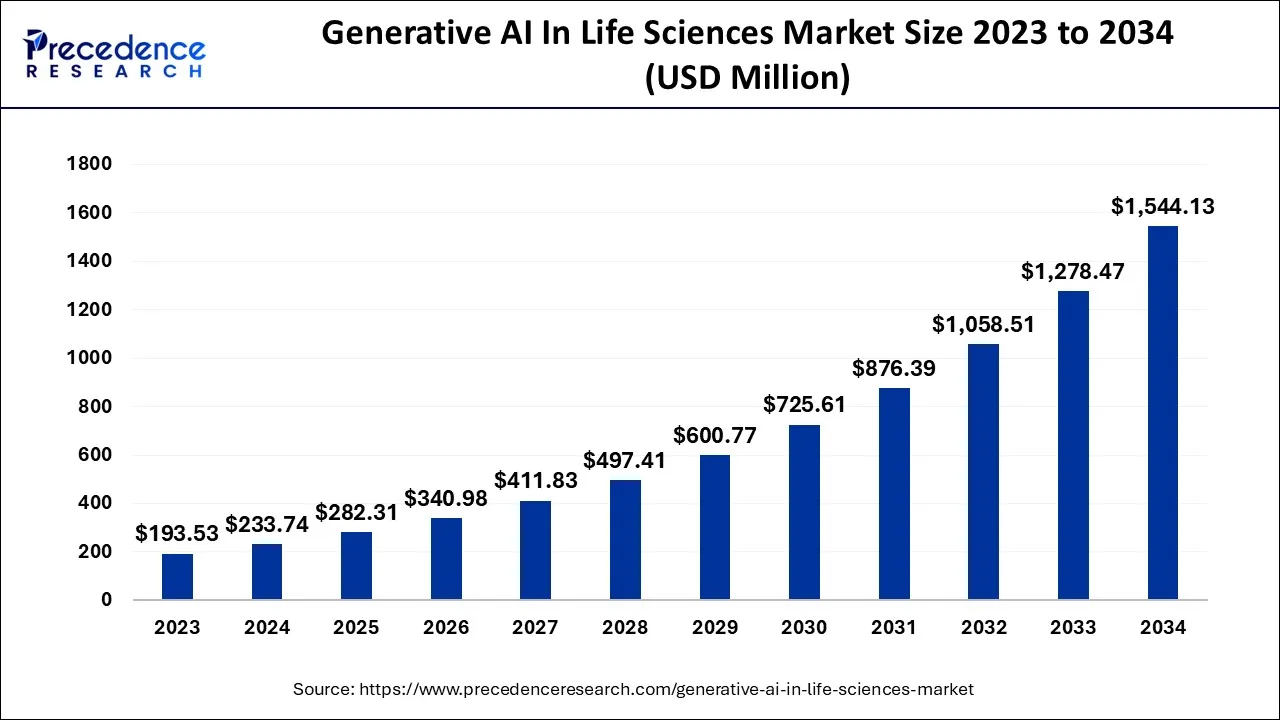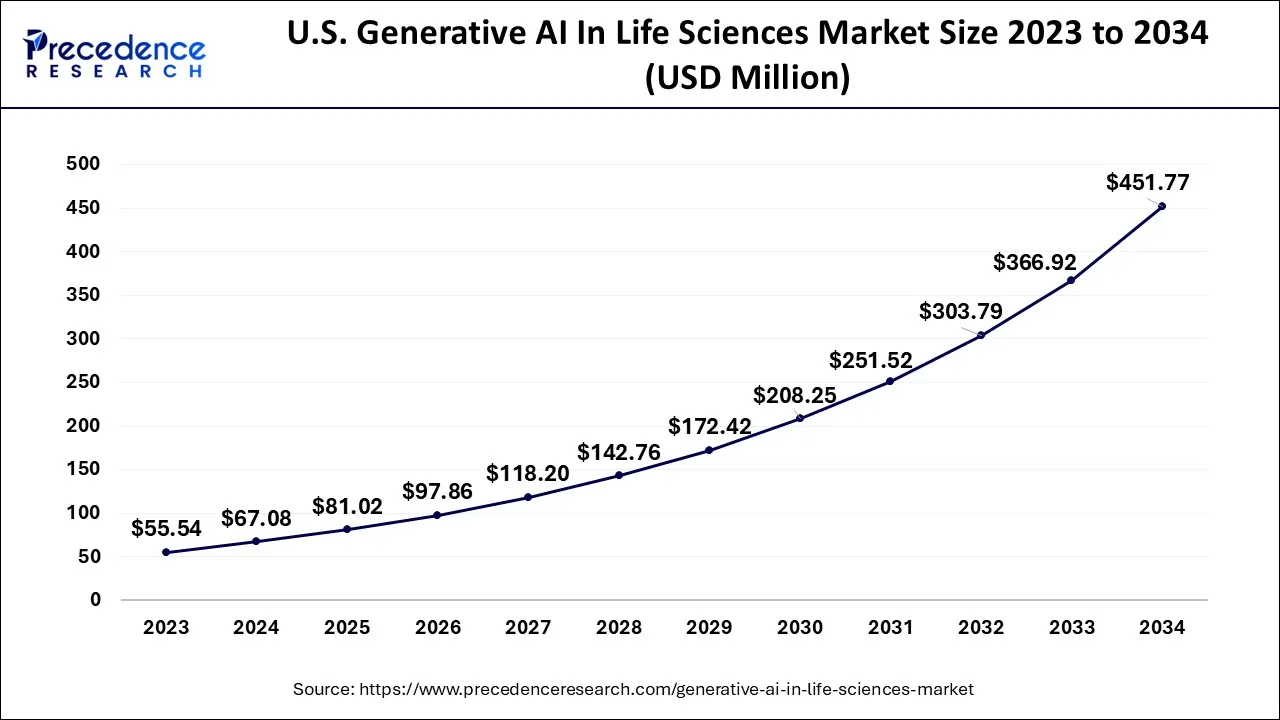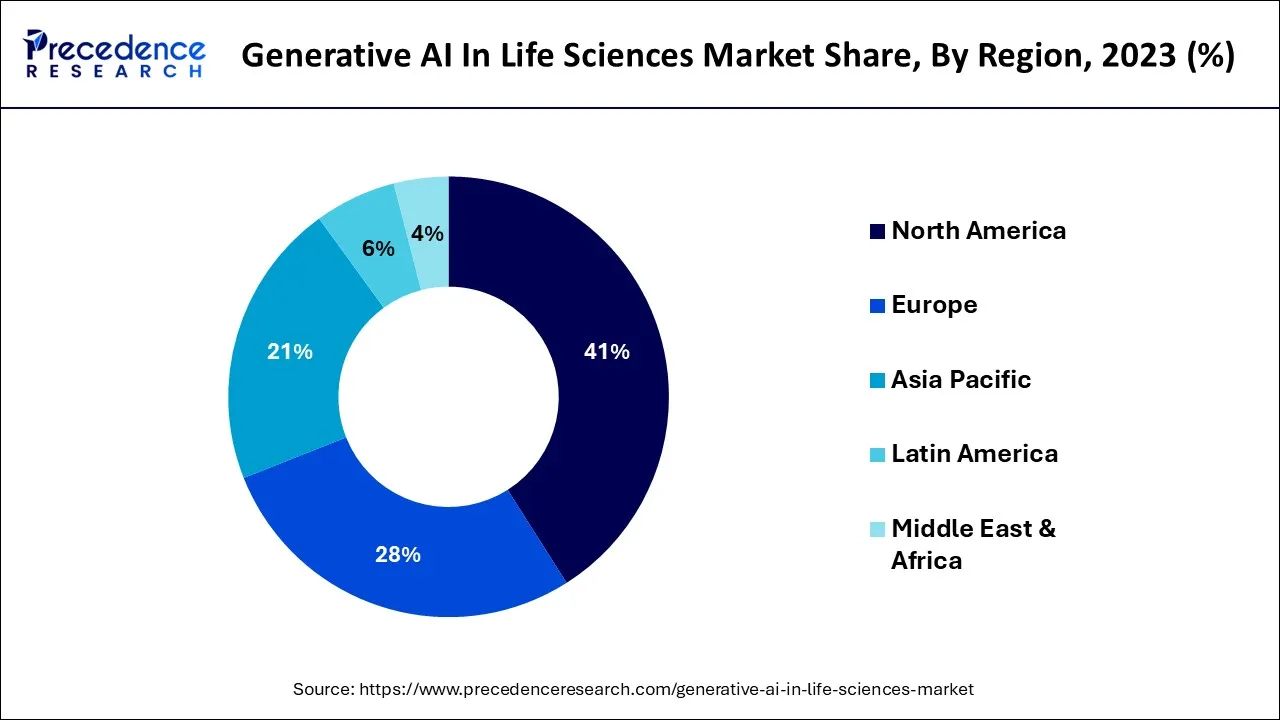January 2025
The global generative AI in life sciences market size is calculated at USD 233.74 million in 2024, grew to USD 282.31 million in 2025, and is predicted to hit around USD 1,544.13 million by 2034, expanding at a CAGR of 20.78% between 2024 and 2034. The North America generative AI in life sciences market size accounted for USD 95.83 million in 2024 and is anticipated to grow at the fastest CAGR of 20.93% during the forecast year.
The global generative AI in life sciences market size is worth around USD 233.74 million in 2024 and is anticipated to reach around USD 1,544.13 million by 2034, growing at a CAGR of 20.78% over the forecast period from 2024 to 2034.

The U.S. generative AI in life sciences market size is accounted for USD 67.08 million in 2024 and is projected to be worth around USD 451.77 million by 2034, poised to grow at a CAGR of 21.01% from 2024 to 2034.

North America dominated the market with the largest market size in 2023. The region is expected to sustain its dominance due to the presence of major and potential pharmaceutical firms across the nation. The higher adaptability of artificial intelligence in the healthcare sector would contribute to the growth of the market in North America. An increasing healthcare advancement in the countries like United States and Canada will propel the growth of generative AI in life science market. Moreover, substantial support of the regulatory bodies by the governments for the adoption and utilization of AI-based solutions in the region will enhance the growth of the market across the region.

Asia Pacific is expected to witness significant growth during the forecast period. The expected growth is attributed to technological advancement in the healthcare sector. The growing population leads to the higher demand for drug discovery and wide life science studies due to the constant rise in chronic diseases, these elements will promote the growth of the market is an increase in this region.
Generative artificial intelligence, a prominent branch of artificial intelligence, has brought significant advancements in the life science field. The penetration of technology highlights the development and bright future of the industry. Generative AI holds the capability of predicting protein shapes and other properties for the life science sector.
The deployment of automated solutions in the life sciences field enables the development of novel protein- and small-molecule therapies. In the biological sciences, generative AI has several uses that help advance research and development, streamline procedures, and produce fresh discoveries. According to multiple reliable research studies, medical and biological sciences will undergo a revolution owing to generative AI. It offers significant potential for the future of the healthcare sector due to its ability to provide worthwhile outputs, accelerate innovation, enhance precision medicine, aid in diagnosis and prognosis, and change drug development.
Due to generative AI, the fields of medicine and the biological sciences are expected to experience an evolutionary change. Modern machine learning algorithms power this innovative technology. Because it can mimic human creativity and create useful results, generative AI has the potential to dramatically change how medical research can be done, make diagnoses, offer effective therapies, and find new medications. Considering these advantages of generative AI in life sciences, the rising emphasis on drug and therapy development will act as a growth factor for the market. One of the most significant advantages of technology is its potential for use in healthcare. To improve the creation of diagnostic tools and medical imaging algorithms, generative AI uses produced medical pictures and patient data.
Generative artificial intelligence (AI) has the potential to speed up the drug discovery process, evaluate enormous datasets and generate predictions regarding pharmaceutical activities. Improved patient outcomes may result from quicker, more affordable medication discovery as a result of utilizing generative AI. Despite the fact that there is a requirement of a massive transformation for creation and application of AI in the life sciences, there are a number of possible advantages of the technology that are observed to promote the field in the upcoming years.
| Report Coverage | Details |
| Market Size in 2024 | USD 233.74 Million |
| Market Size by 2034 | USD 1,544.13 Million |
| Growth Rate from 2024 to 2034 | CAGR of 20.78% |
| Largest Market | North America |
| Fastest Growing Market | Asia Pacific |
| Base Year | 2023 |
| Forecast Period | 2024 to 2034 |
| Segments Covered | By Technology and By Application |
| Regions Covered | North America, Europe, Asia-Pacific, Latin America, and Middle East & Africa |
Emphasis on drug discovery
The main purpose of drug discovery is to enhance the treatment quality and effectiveness. Generative AI in drug discovery overcomes the drawbacks of the traditional method. Artificial intelligence eliminates the drawbacks by detecting novel interactions. The study of life science during the drug discovery process can be made faster and more effective by using generative AI, as it uses machine learning and complex algorithms to gain important information from the database of the patients to create personalized solutions for drug discovery while offering a wide and brief data for examining living organisms.
The models of generative AI may evaluate huge amounts of genetic data, for example, to identify potential therapeutic targets and predict drug efficacy and toxicity, which can greatly speed up the drug development process. Generative AI is used to customize a patient's medical care based on their particular genetic makeup, lifestyle, and environmental circumstances. Medical professionals may choose the optimal course of therapy with the help of AI algorithms that analyze patient data and anticipate the benefits and drawbacks of specific treatments. Considering the benefits of generative AI in life science study and drug discovery process, the rising emphasis on novel drug development will fuel the market’s growth.
Data privacy concerns
Data privacy and security is the major issue in the growth of the market. Generative AI in life science has to perform its operations with a massive database. Cyberattacks are a major concern in the digital era. There are chances of data sharing and cybercrimes, especially on cloud-based generative AI systems. This element acts as a major restraint for the market. Hence there is a requirement for proper security for data which should prevent data breaching and leaks. The organization must be avail of the data protection regulation for the prevention of data of consumers. To minimize the error in the organization's data privacy, they must prioritize the workflow's transparency. And there are some additional data protection essentials such as access control, robust data security practices, encryption, and regular audits that must be implemented by the organization to protect against data breaches.
Deployment of GPT-3 technology model
The most current iteration of the generative language model developed by OpenAI, GPT-3, has the potential to drastically change how AI is applied in the life sciences. The deep learning algorithms that GPT-3 uses to create writing that resembles human speech have been trained on vast quantities of data, allowing it to produce top-notch text on a variety of topics. GPT-3 has the potential to drastically alter how data is processed and understood in the biological sciences. The way data is analyzed and processed in the biological sciences might be dramatically changed by GPT-3. Thus, the penetration of the GPT-3 technology model opens up opportunity for the market’s growth.
The novel molecule generation segment dominated the market with the largest market size in 2023. Given a variety of structurally different medications, the produced molecules acquire superior qualities. Additionally, the penetration of this technology with generative AI offers precise and desired molecule profile during the life science studies or research processes.
The protein sequence design segment is expected to grow at a significant rate during the forecast period. The growth of the segment is attributed due to its use for the development of new drugs for the treatment of genetic diseases. Due to the possibilities of generating 3D structures, the aspects of the drug discovery process are predictable with the help of generative AI.
The drug discovery segment dominated the market with the highest market share in 2023. With predictive AI capabilities, generative AI is becoming more and more popular as a tool for drug development. The popularity of ChatGPT is helping to increase interest in the technology used in drug discovery. Molecular structure optimization, innovative drug candidate prediction, and big data analysis are all possible with generative AI. Several businesses have already noticed significant time savings as a result of the technology.
The clinical trials segment is expected to significantly boost its share during the anticipated timeframe. The growth of the segment is driven by the rising need for the management of large amounts of data in healthcare administration. Clinical trials are the initial point in the development of evidence-based, and technically advanced drug development of the latest treatment. Using clinical trials reduces the time and effort of finding the patients for trials. Generative AI in clinical trials is used to track the progress of patients. It is observed to help the patients to access the treatment which is required.
Segments Covered in the Report:
By Technology
By Application
By Geography
For inquiries regarding discounts, bulk purchases, or customization requests, please contact us at sales@precedenceresearch.com
No cookie-cutter, only authentic analysis – take the 1st step to become a Precedence Research client
January 2025
July 2024
September 2024
January 2025